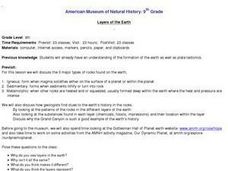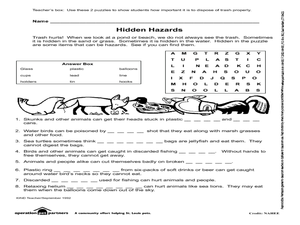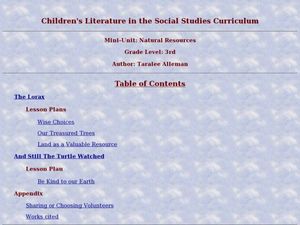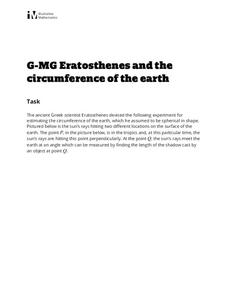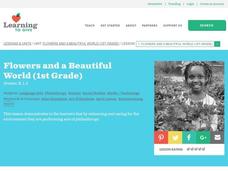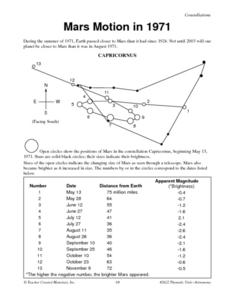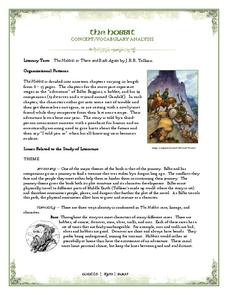Curated OER
Save the Earth: It's Everyone's Home!
Students complete activities to become more aware of environmental issues and the effect on plants and animals. In this environmental issues activity, students use a globe to discuss issues with the environment. Students then take a trip...
Curated OER
Let's Clean Up Our Act and the Earth!
Learners complete activities that help clean up the Earth and protect the environment. In this Earth protection lesson, students go outside and listen to the environment. Learners discuss their observations and their role in protecting...
Curated OER
Circular Motion
Students research physical science by completing worksheets. In this gravity lesson, students read assigned text regarding the rotation of Earth and the gravitational force caused by the speed of which it rotates. Students complete a...
Curated OER
Degrees Of A Circle Exercises
In this math worksheet, students examine the fractional parts in order to determine the degree equivalent within a circle. Then they do the same using drawn circles.
Curated OER
Happy Lesson: The Earth's Crust
This PowerPoint provides a multiple choice and fill-in-the-blank format for reviewing vocabulary and related content following an "earth's crust" science unit. The information is concise and age-appropriate and the font and colors are...
Curated OER
Be Kind to our Earth
Students make a list of ideas on ways we can take care of our Earth and complete a class project planning sheet where they problem solve to help save the Earth. In this Earth lesson plan, students also play a conservation charades game.
Curated OER
Explore the Mathematics of the Explorers
Columbus and other explorers relied upon mathematical calculations using the Earth, stars, and ships speeds.
Illustrative Mathematics
Eratosthenes and the Circumference of the Earth
The class gets to practice being a mathematician in ancient Greece, performing geometric application problems in the way of Eratosthenes. After following the steps of the great mathematicians, they then compare the (surprisingly...
101 Questions
Brita
It's hard to envision what 39 billion plastic bottles look like. Brita claims that the US uses that number of plastic bottles each year! If that's not enough to get your attention, figure out how many times 39 billion water bottles can...
Curated OER
Comparing Earth and the Moon
In this Earth and moon worksheet, students will complete a Venn diagram comparing the characteristics of the moon and the Earth. The Venn diagram has a fill in the blank statement in each circle with blank lines for students to fill in...
Curated OER
Flowers and a Beautiful World: Earth Day (1st)
Students consider caring for their environment. In this environmental stewardship lesson, students read Miss Rumphius and discuss how sharing their time, talent, and treasure through volunteering makes the world better.
Curated OER
The Tilt of the Earth And the Seasons
Fourth graders measure the change in the size of their shadow over time. They visit a fixed structure and record the date, the time, and the measurement of the length of their shadow. They do this over the course of the school year. They...
K12 Reader
Why Does the Moon Orbit Earth?
Have you ever looked up at the moon and wondered why it looks different every night? Learn about the moon's orbit and the lunar cycle with a reading comprehension exercise. Using context clues, kids find the definitions of unfamiliar...
Curated OER
Globe Lesson 11 - Rotation of the Earth - Grade 6+
In this rotation of the Earth worksheet, students read a 2-page review of the rotation of the earth and respond to 10 short answer questions.
Curated OER
Earth Day and "The Lorax" Lesson Plans
Earth Day can be a way for students to explore their relationship to the world around them and read great literature like "The Lorax."
Curated OER
Mars Motion in 1971
In this science worksheet, learners read about the summer of 1971 when the Earth passed closer to Mars than it had since 1924. Students also learn about the retrograde motion of Mars as seen from Earth.
Curated OER
Incoming Solar Radiation
Demonstrate how the spherical shape of the Earth contributes to unequal heating of its surface and results in varying climates at different latitudes. This would be an illuminating addition to your meteorology lessons, especially when...
California Academy of Science
Kinesthetic Astronomy: Moon Phases
We are the world! Each of your class members models Earth and holds a styrofoam ball to see its phases. Thorough teacher background information and a detailed lesson plan will make this a cinch to teach. If you do not want to purchase...
Novelinks
The Hobbit: Concept/Vocabulary Analysis
Considering using Tolkien's The Hobbit for book circles or whole-class reading? Check out this packet that provides an overview of the novel, some interesting background materials, and links to additional resources.
Port Jefferson School District
Climate Patterns
Young climatologists explore the factors that contribute to a region's climate in this two-part earth science activity. To begin, learners are provided with a map of an imaginary planet and are asked to label global wind and...
Curated OER
Why do Stars Rise in the East?
In this stars rise in the east learning exercise, students use geometry to show how the Earth rotates from west to east and why celestial bodies appear to rise in the east and set in the west. Students draw a figure and label given...
Curated OER
The Solar System
Students construct a sketch of the planets in our solar system using concentric circles and angles. In this solar system lesson plan, students plot the position of each planet on concentric circles using graph paper. The sun is included...
Curated OER
Geometry In Space
Students Fulfill the requirements of Texas Standards as it relates to math and science. In this circle lesson, students identify the arcs and angles of a circle as it relates to Pi. They solve real life scenarios using space as an example.
